In October 2014, Mrs Offiong (not real name) received some documents from Metropole Interproject Limited introducing the sale of a “one unit of three-bedroom corner piece bungalow apartment at South Pointe II Estate” at Ajah, Lagos, for N17,967,000 million. She was instructed to pay 50 percent of the cost if she accepted the offer.
Retiring at the top cadre in the civil service after 30 years, she did not hesitate to invest her gratuity because the supposed estate was in a prime location: the building’s specifications and the estate’s facilities as stated in the contract looked top notch; the delivery date was less than a year away in August 2015.
Shortly after paying the initial deposit of N8,983,500 million to Metropole Interproject Limited and a receipt bearing the name of its parent company, Gran Imperio Group was issued to Mrs Offiong on a scheduled visit to the site, Gran Imperio Group took subscribers to South Pointe One, instead of South Pointe II.
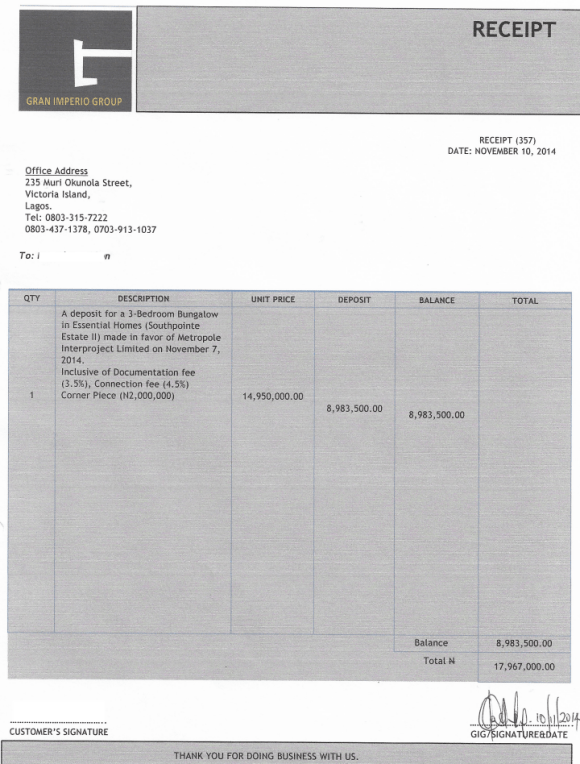
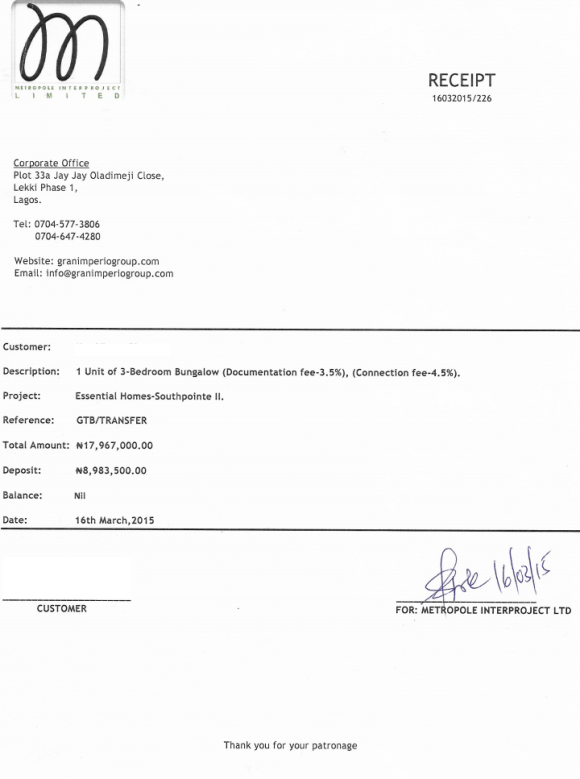
“They told us that South Point II was not ready yet, so they took us to South Pointe One to show us what two would look like when it was ready,” said Mrs Offiong’s son, James (not real name), who went with his mother to the site. “There was a bit of confusion that day. We suspected that something was not right but we calmed down when they told us about another estate that would be completed before South Pointe II.”
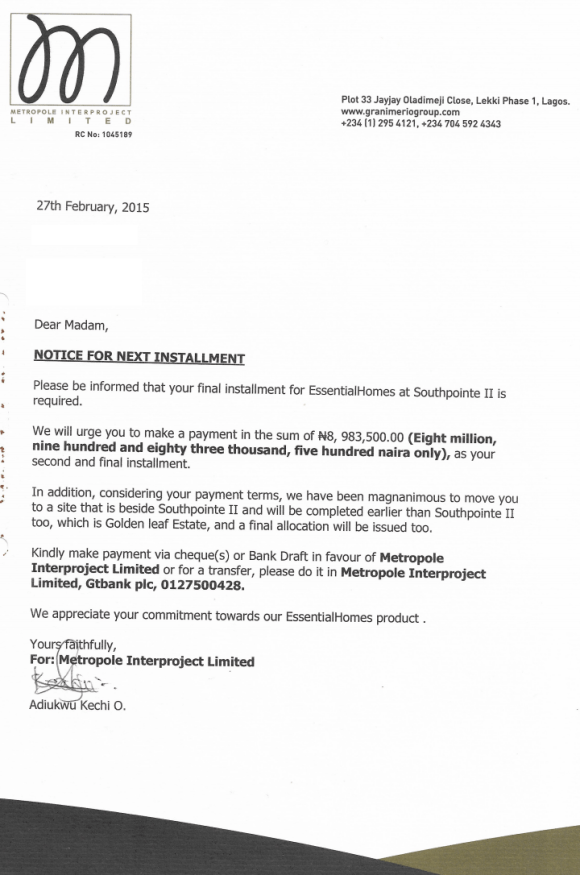
In a letter to subscribers in February 2015, Adiukwu Kechi, an official of the company, notified subscribers of the need to pay their next instalment. To get them to commit to completing their payments, although no land was shown to subscribers during the site visit, Kechi added: “We have been magnanimous to move you to a site that is beside South Pointe II and will be completed earlier than South Pointe II too, which is Golden Leaf Estate, and a final allocation will be issued too.”
FINAL DEPOSIT YET NO HOUSE

On the day Mrs Offiong made the final deposit of N8,983,500 million, she received a letter from another staff of Metropole Limited, Nnamdi Ukpabi, notifying her of the allotment of ‘Block F Unit 1’. But on the delivery date of August 2015, Mrs Offiong and hundreds of other subscribers found out that what they had were buildings and land on paper; they had been defrauded by companies headed at the time by Adeyeye Enitan Ogunwusi, a man later crowned the Ooni of Ife in December of the same year.
Many investors, citing fear of backlash from the monarch, declined to go on record, but they accused the company of defrauding them. FIJ managed to track five people who agreed to provide documents and correspondences with the companies’ officials on the condition that their identities were not revealed. Visits to the locations of the supposed estates, revealed that the estate schemes never materialised.
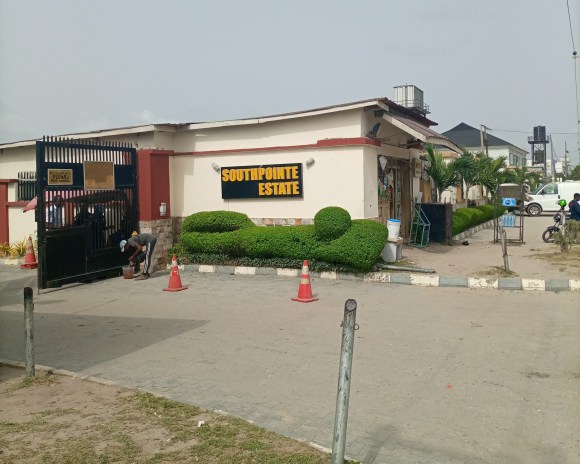
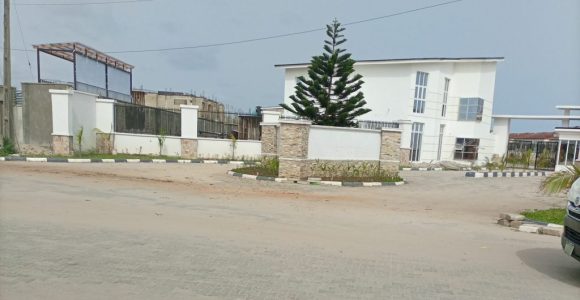
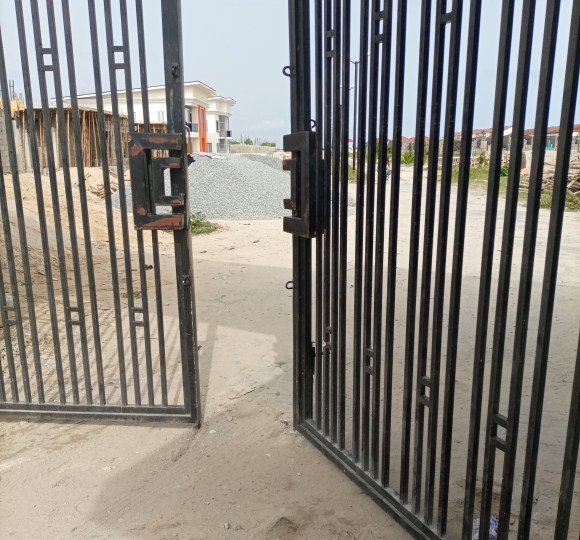
Gran Imperio Group’s subsidiary companies, including Howard Roark Limited and Metropole Interproject Limited, were involved in ‘Essential Homes’, an ambitious scheme to build and deliver 1,000 affordable bungalow houses to middle and low income earners by the end of 2015. Launched in 2014, six estates — Lakeview Park I and II; Mid-Land Court; South Pointe I, II; Golden Leaf Estate; Y’hello Estate — were reportedly created by the company.
FIJ’s check on the Corporate Affairs Commission (CAC) portal of real estate companies with links to Ooni Ogunwusi revealed that Gran Imperior Group of Companies was registered in November 14, 2013, while Howard Roark Limited was registered in 2008. They have inactive status on the portal, which possibly means that they had not filed tax documents in a long time. Metropole Interproject Limited did not appear on the CAC portal.
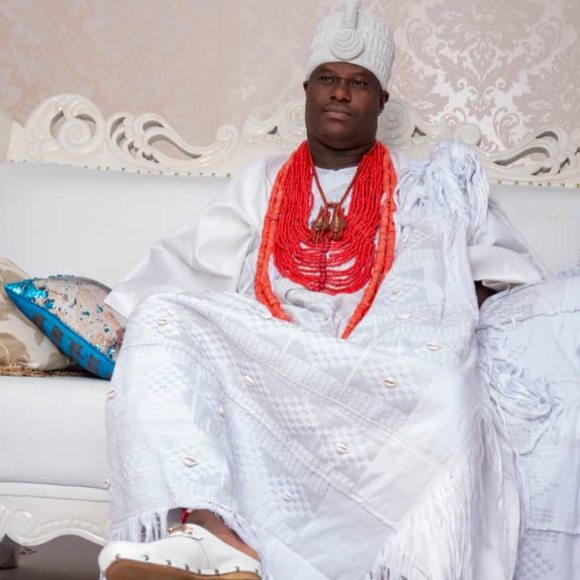
Investigations by FIJ confirmed that Ogunwusi, his daughter Adeola Ogunwusi and 12 others are directors of Gran Imperio Group of Companies. The Ooni of Ife also sits as director on the board of Howard Roark Limited.
ESSENTIAL HOMES: CUTTING CORNERS BY BUILDING WITH FAKE MATERIALS ON ENCROACHED LAND
“…We will work towards satisfying our subscribers…,” Ogunwusi said in 2015.
“We like to distinguish between completed development and successfully completed development. For us, a project is successfully completed when it is fully occupied.”
But some estates in the Essential Homes scheme were not successful. While many units in South Pointe One were built with substandard materials, others were built on a land that does not belong to Gran Imperio. Golden Leaf Estate did not materialise and South Pointe Two does not exist!
“Fortunately, I got my house, though in a sub-standard state. I did what I needed to do and moved on with my life,” replied an investor in South Pointe One, asked by FIJ to be interviewed for this investigation. “Those that I think need your story more are those who paid but didn’t get anything and those whose houses were built on land that doesn’t belong to the Ooni.”
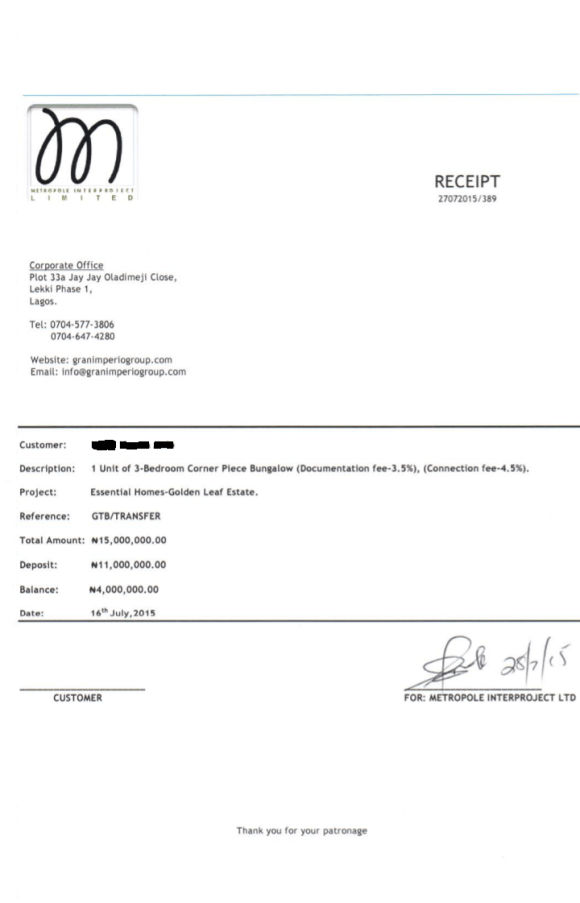
Indeed, for other investors, it was not just substandard buildings; they do not have title deeds recognised by the Land Bureau, a problem tying down their investment, making them unable to sell the properties.
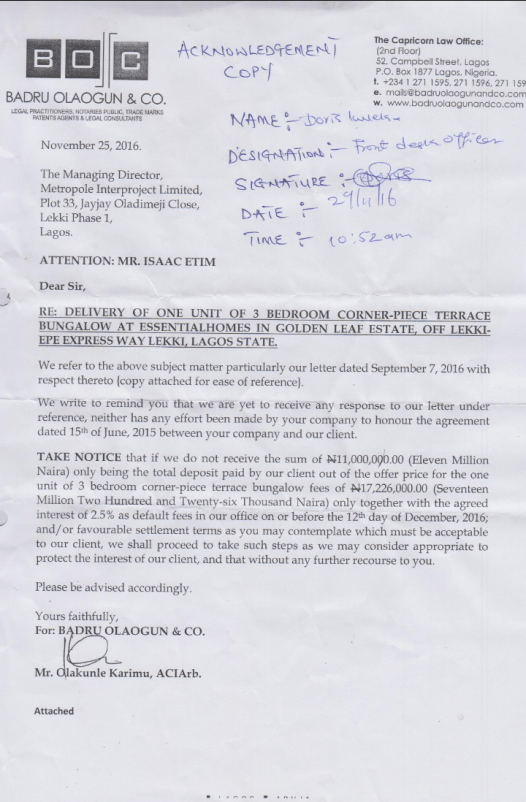
“Apparently, Gran Imperio trespassed into some of the Ojomu land and did not have the right to build my two units on in,” said Mrs Ajenifuja (not real name), an investor in the South Pointe One and Lakeview Park Two. “I have tried now for four to five years with no luck with the Ojomu family as they claimed they were still having issues with Gran Imperio.”
Investors who paid as much as N30million for a unit told FIJ that many of the apartments built in Lakeview Park Two and South Pointe One did not meet the specifications stated in the contract. They had to spend more money to make the apartments habitable.
“For South Pointe one, I had to do the finishing myself. It was like demolishing and building a new house,” said Ms Mallama (not real name), who paid N11 million deposit for Golden Leaf the same period she invested in South Pointe One. “I took them to court over the delay and and substandard building and was given a judgment against them and awarded damages which they haven’t paid. I just left it.”

The buildings were also delivered late — as much as nine months after the stipulated delivery date — a breach of agreement that should have made Gran Imperio liable to paying a default fee of 2.5 percent of the deposit received. But investors never got that payment.
NO PROPERTY, NO REFUND. ESTATE PROMOTED BY THE OONI DOES NOT EXIST
In 2015, Ogunwusi stated that Golden Leaf Estate, a 380-unit apartment developed in collaboration with the British American Tobacco Company (BATC), was undergoing construction and would be delivered in a year.
Subscribers were required to make an initial deposit of 30 percent of the offer price, 40 percent at roofing stage and 30 percent upon completion. Six years later, hundreds of subscribers neither got apartments nor refunds.
Mr Jonathan Abu (not real name) was one of them. He initially subscribed to South Pointe Two but agreed to be moved to Golden Leaf Estate because of the ‘boys quarters’ attached to the bungalow and its proximity to his work place on the Island.
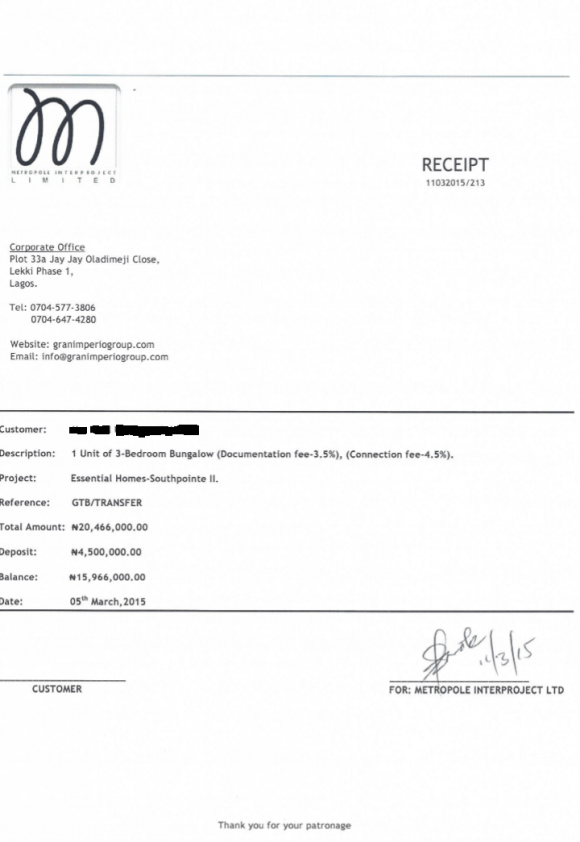
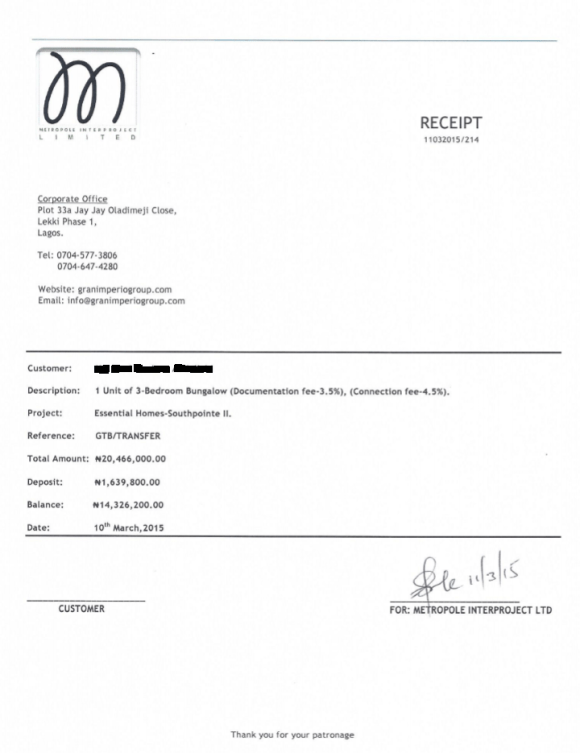
After he made the first deposit of N6,139,800 in March 2015, nothing happened on the land and he never heard from Metropole Interproject Limited until August 2016, nearly a year and a half after. In a letter signed by two directors of the company, Taiwo Akintayo and Isaac Etim, the company stated that it did not meet delivery schedule because of “unresolved land acquisition issue”. It said a relocation of the project to another site was in consideration.
‘I WOULD SAY I WAS DEFRAUDED’
Abu had had enough and he wanted his money back, but he never got it. The company, again, breached a provision in the contract that monies would be returned 90 days after a request was made.
“I would say I was defrauded,” he said. “Besides money, I have to stay in traffic for two hours, the impact on my health in terms of the wear and tear and cannot be quantified.”
FIJ also gathered that employees of the BATC who invested in Golden Leaf estate through the company’s cooperative society did not get properties or refunds. BATC did not respond to FIJ’s request for comments.
More Investors Onboarded to Already Distressed Projects
In a sworn affidavit by Isaac Etim, one of the directors of Metropole Interproject Limited in 2016, in response to a winding up petition written by an investor, the company blamed the country’s economic crisis for failing to deliver projects. But investors argued that Nigeria’s economy only began slowing in growth in 2016.
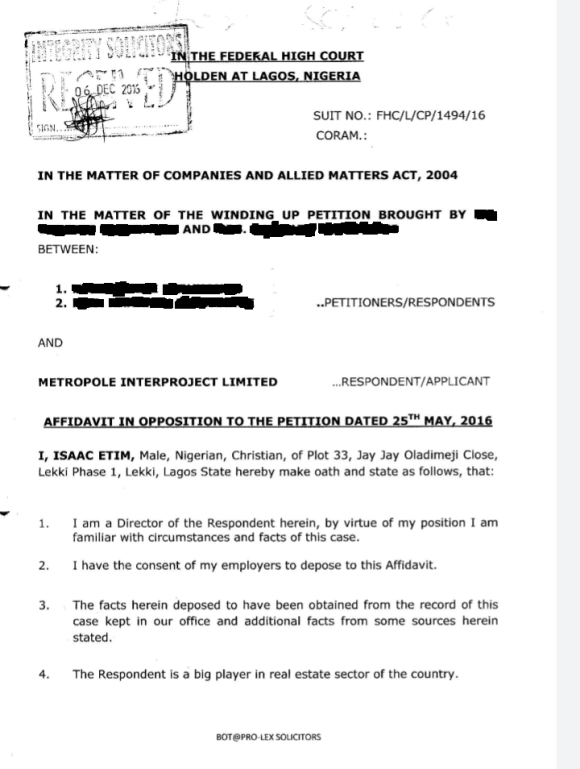

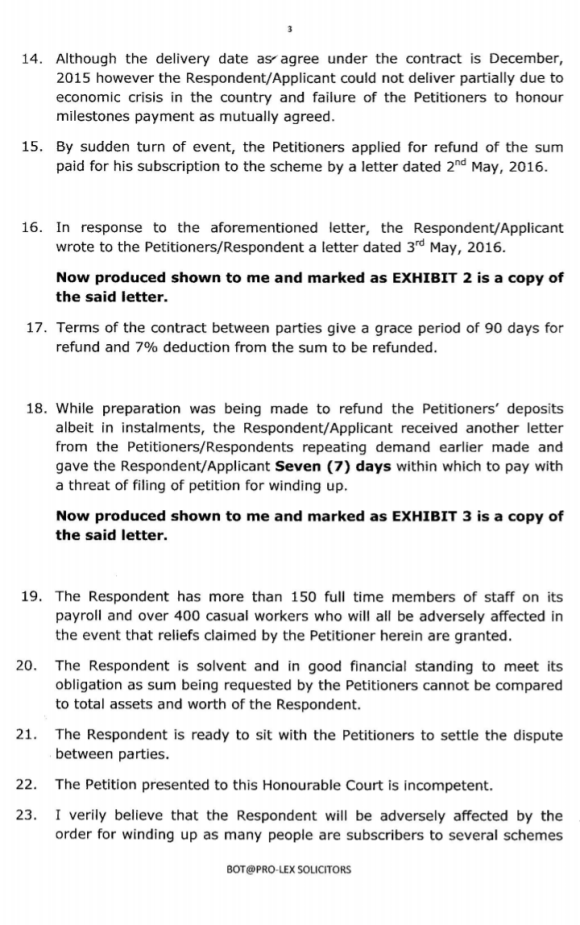
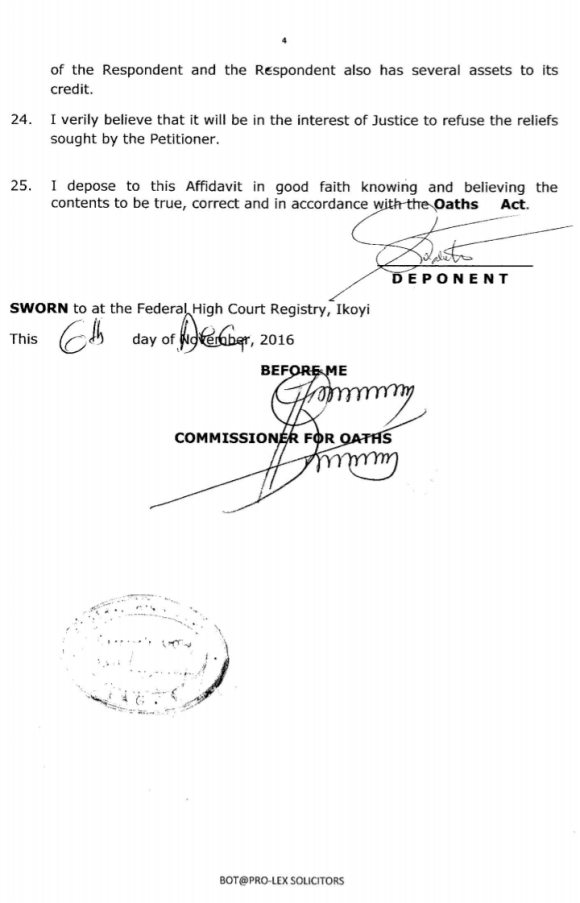
It is not clear when economic downturn began affecting the real estate project; nevertheless, analyses of documents received from subscribers showed that many times in the two years preceding the 2016 economic recession, the company continued accepting money from investors and promised different delivery dates. In February 2015, the media reported Ogunwusi promoting the real estate scheme.
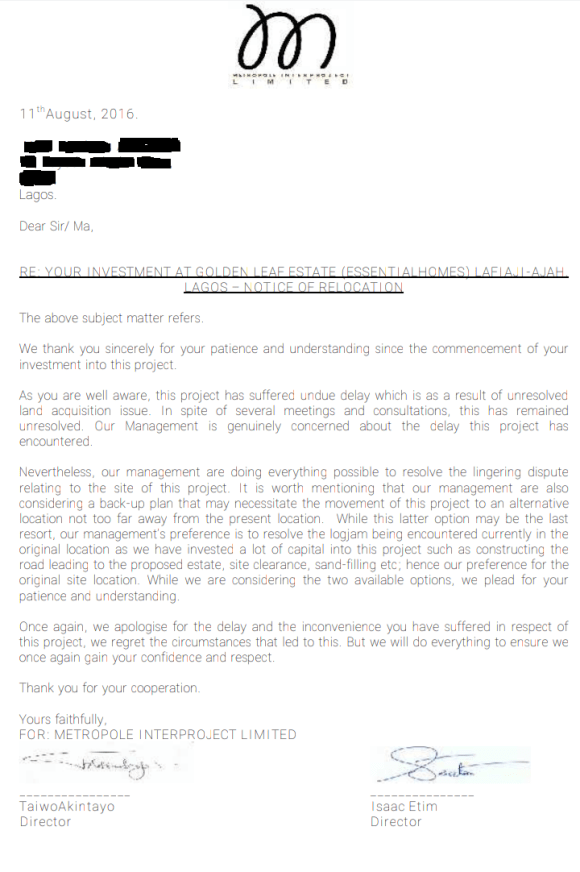
Correspondence to investors by directors of the company also blamed land acquisition issues for the delay. A reason not many believe; they accuse the firm of not doing due diligence before collecting billions of naira from investors.
Some investors pondered why new subscribers were onboarded when the project was supposedly undergoing challenges that would make completion difficult, and why the promoters could neither show proof of land nor uncompleted buildings if truly the project was started but stalled by economic recession.
A letter to all subscribers by Bamidele Arowolo, Gran Imperio’s Chief Operating Officer, assuring them that all “hindrances” had been resolved and apartments would be delivered from May 2016 turned out false.

The company subsequently relocated to an unknown location and staff members stopped replying mails and answering phone calls, investors lamented.
BILLIONS COLLECTED BUT NO PROPERTY, NO REFUNDS
Having seen Ooni Ogunwusi rub shoulders with politically powerful peole, including President Muhammadu Buhari, who many times said that no acts of corruption would go unpunished in his administration, some investors, at the time, got discouraged and simply “handed the matter to God”. Others who frantically headed to court soon found that it was an exercise in futility.
With multiple law suits, Ogunwusi’s company selected court hearings to attend and failed to honour out-of-court agreements and judgments, FIJ was told. While some were refunded a fraction of the money they invested, others got nothing.
“So when we went to court and they never showed up, I just knew nothing would come out of this. They probably would just kill the case,” said Oluwashina (not real name) who lost N5,010,000 to the South Pointe Two scheme and was not refunded. It was the first major project he started with his wife.

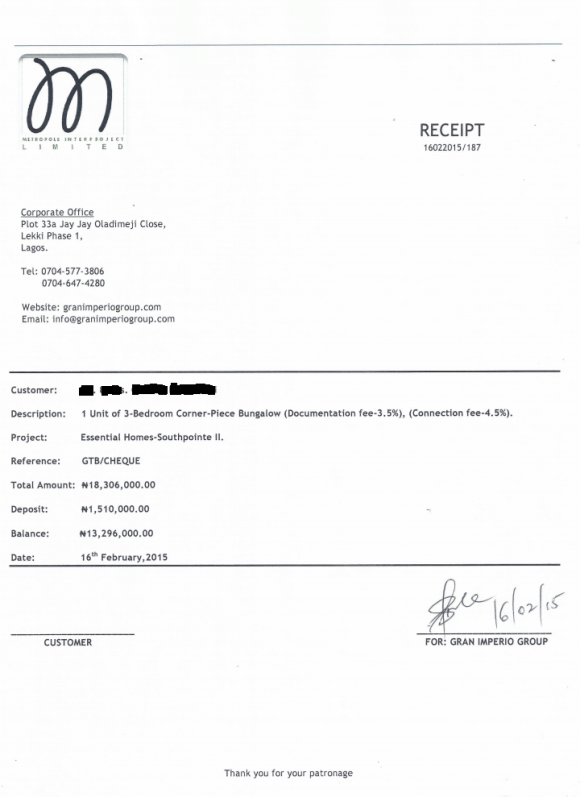
In addition to suspicions by subscribers that Ooni Ogunwusi was using his influence to frustrate the court cases against his companies is the question: is the company financially capable of paying hundreds of investors it owes millions of naira?
Isaac Etim, one of the directors of Metropole Interproject limited, claimed in a sworn affidavit that the company was “solvent” and in “good financial standing”, adding that “the sum being requested by the petitioners cannot be compared to total assets and worth of the respondent” — a claim that did not result in refunds to the investors.
The petitioners’ lawyer, Mr Lawrence Owube, told FIJ that the case could not “proceed beyond getting a liquidator to take over the supposed assets of the company because we could not even find it anywhere”.
“They have nothing to recover,” he said. “The company was more or less like a shell company; they have no asset, nothing physical to recover from them.”
‘AN ELABORATE SCAM’
Etim may have committed perjury by lying under oath, a crime punishable by imprisonment, considering Barrister Owube’s revelations.
Nnamdi Ukpabi, the marketing officer of Gran Imperio, was contacted for comments, as his name had appeared on many documents seen by FIJ. “I was just an employee, go and ask the drectors what they did with the company and don’t call me again,” he said aggressively.
For months, accusations that top management officials of Gran Imperio defrauded investors, lingered. Even the Ooni of Ife was not spared. Unlike many investors who did not have direct access to Ogunwusi when he became King, a subscriber, Oluwaloni (not real name), used his contacts in Nigeria’s federal Government and the diplomatic community to put pressure on the Ooni. He said that the project was an “elaborate scam”.
“Ogunwusi himself explained to me that he had sold the company to the management of the company, when he became the Ooni of Ife,” said Oluwaloni, who had paid N6.7million but got only N1million as refund.
“If I was a novice in finance that would fly, but what I saw that happened was that he was trying to remove his name from the board so all he did was he just sold off the company in a sort of way that makes it look like he was no longer the owner but he was still the owner.
“After they discovered that they could not pay us, they started selling the plot again to other unsuspecting people — to make payment to old people. At a point, they were telling me that if I could get someone that would subscribe to the project, they would be able to pay me.”
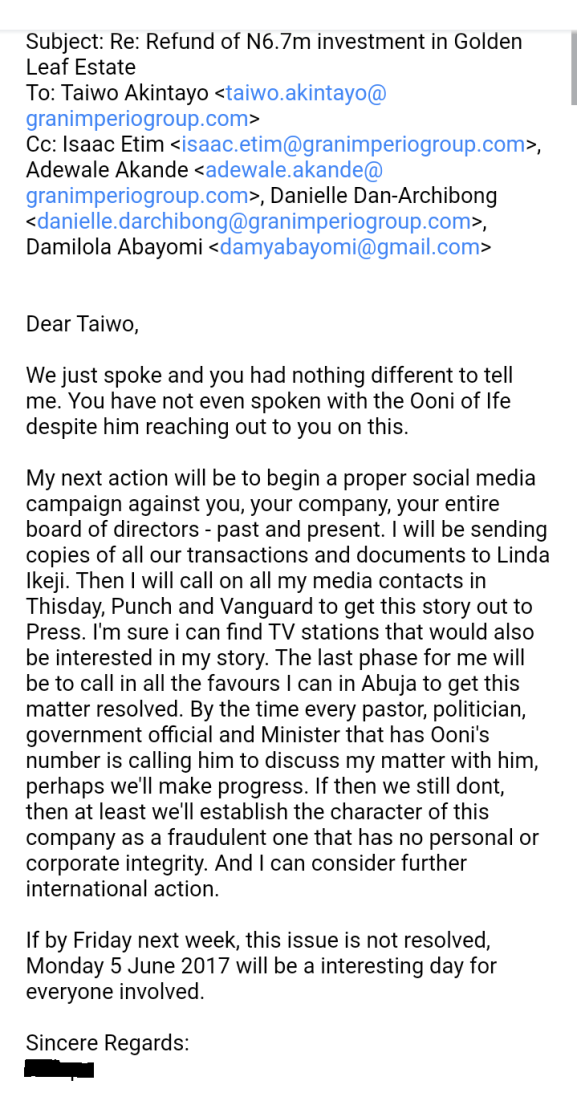
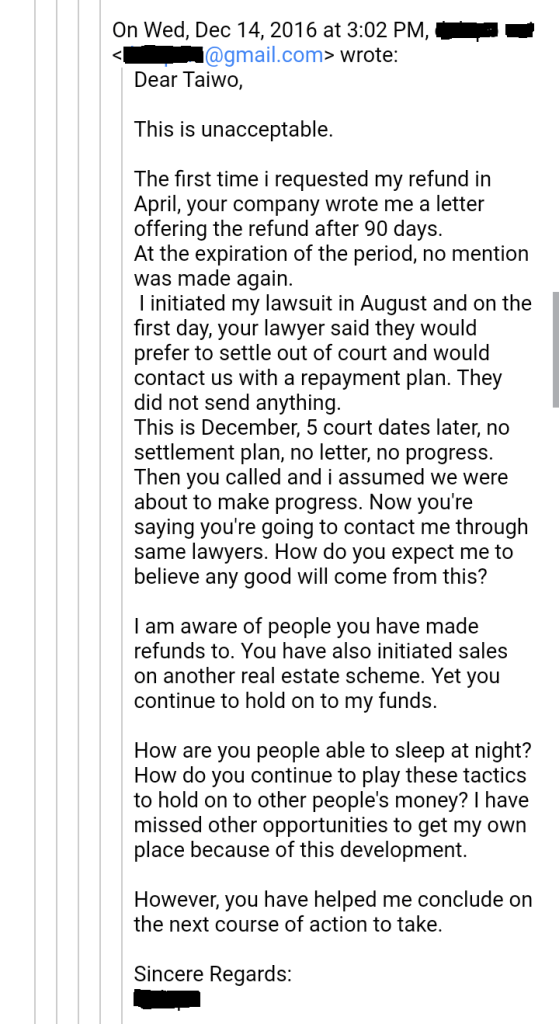

THE OONI ENCOURAGED INVESTORS TO PAY BALANCE DESPITE KNOWING PROJECT WAS DISTRESSED
Ooni Ogunwusi knew about the problems investors had with his company, as a letter to all subscribers shortly after he became the Ooni showed. The letter, signed by the Ooni, stated his position as Chairman and was co-signed by Taiwo Akintayo. It was written on January 2016.
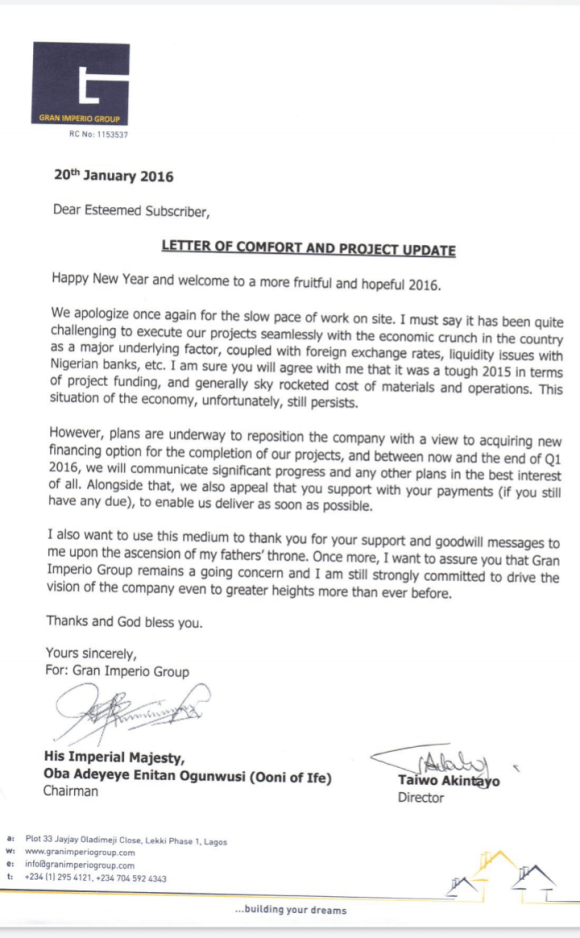
It began with an apology for “slow pace of work” and continued by listing some challenges. He further urged investors, many who neither saw land nor building on the supposed estate, to “support with your payment (if you still have any due) to enable us deliver as soon as possible”.
“I want to assure you that Gran Imperio Group remains a going concern and I am still committed to drive [sic] the vision of the company to even greater heights more than ever before,” Ogunwusi wrote.
EVASIVE GRAN IMPERIO STAFF
Efforts to get comments from Gran Imperio were unsuccessful. A lady who answered the call to one of the phone numbers on the firm’s letterhead, claimed it was a wrong number. A call to the second number was answered by one Humphrey Obadjere, who claimed to be an accountant that had left the company.
“My job was to accept money and keep accounts; I can’t speak about the matter; talk to sales people who interface with the subscribers,” Obadjere said, declining to tell FIJ’s reporter the current address of Gran Imperio.
Tayo Ibironke, the Sales Manager of Gran Imperio at the time the alleged fraud occurred, questioned why he was contacted as he no longer worked at the firm. He dismissed questions and asked to be contacted after an hour, but subsequent calls to him after the hour did not connect.
Tayo Akintayo, a director at Gran Imperio, neither answered multiple calls to his number nor replied text messages. Calls to other persons in charge of the company as of when hundreds of investors were allegedly defrauded, including Isaac Etim, Head of Sales, and Sylvester Oyewole of the Finance and Accounts Department, did not connect.
The Ooni of Ife could not be directly reached for comments. His Personal Assistant, Tomisin Olawale, refused to explicitly state Ooni Ogunwusi’s connection to Gran Imperio. He said questions should be directed to Gran Imperio’s staff dealing with the daily operations of the company.
“He (Ooni Ogunwusi) would not be able to answer even if you were in front of him; he would still tell you to go and meet the MD of the company,” Olawale said, parrying other questions.
A NONEXISTENT COMPANY
FIJ tracked Gran Imperio to three locations on Lagos Island. No one on Plot 33 Jay Jay Oladimeji Close, Lekki Phase One, had heard of the company.
At Lake View Park One Estate, it was gathered that the company has an office at Lake View Park Two, were buyers of properties go for verification. The security men at Lake View Park Two Estate would not clearly state whether the company that owns the property they work for has an office in the estate. They also denied FIJ access to the company.
FROM LAGOS, OONI’S CASE FILE SUDDENLY TRANSFERRED TO ABUJA

Shortly after James Offiong reported Ooni Ogunwusi and his company directors to the Lagos office of the Economic and Financial Crimes Commission (EFCC) over the loss of his mother’s gratuity to a bungled real estate investment, N4 million was refunded within one year. The remaining N13,967,000 was never recovered.
“After a while, we went back to the EFCC to keep pushing and then they said the file had been sent to Abuja; who will go to that place to fight this?” James asked. “Although they did not tell us that there was nothing they could, it showed on their faces; everybody was just looking at us with pity.”
When contacted, Wilson Uwujaren, the EFCC’s spokesperson, declined to confirm whether a complaint file against Ooni Ogunwusi was transferred to Abuja to frustrate the case. He requested that documents should be sent to him before he would give comments.
Two days after Oluwashina wrote to the Consumer Protection Council (now the Federal Competition and Consumer Protection Commission) in 2016 requesting assistance in recovering his money, he got a reply from Joshua Nggada, the head of the Lagos office of the agency, informing him that investigation had begun.
But that was the last he heard from the agency. Oluwashina neither recovered his money nor received a feedback on the progress of the investigation.
Both the Federal Competition and Consumer Protection Commission and its Director General, Babatunde Irukera, did not respond to requests through multiple channels for comment about why the Commission went quiet on the petition for many years.
‘THE LAW IS RIGGED TO FAVOUR THE POWERFUL’
Years after, investors are pained that no one has been held accountable.
“A lot of people in this country believe they have the law enforcement in their pockets, collect money from people and not deliver… in other countries, subvert the law and you go to jail, no matter who you are,” said Abu.
Despite the controversies his companies are enmeshed in, Ooni Ogunwusi has not publicly made comments. The directors of the companies have disappeared; some have started their own real estate firms.
“If Gran Imperio is the Nigerian entity involved in the alleged fraud, it is not impossible to lift the veil of incorporation to discover the individuals behind the company and hold them accountable,” said Abimbola Ojenike, a Lagos-based lawyer and FIJ’s Legal Adviser.
“Directors of the company or persons in the effective control of the company cannot hide behind the corporate veil to avoid liability especially if they are the ‘humans’ involved in the specific incriminating conduct for which the company has been accused.”
In their quest to get justice, frustrated investors described the process as “rigged to favour the powerful”, forcing them to almost give up on Nigeria.
“On a personal note, I think it’s necessary for us to have values as a country and there should be justice,” said James.
“Ensuring justice is how you provide equity to people who are at the bottom and how you can hold people at the top accountable. We don’t take the issue of justice and pervasion of justice seriously in this country.”
culled -- Foundation for Investigative Journalism (FIJ)




